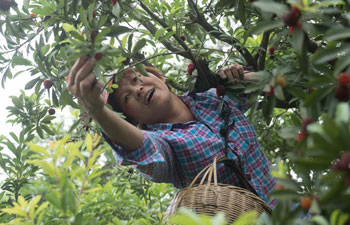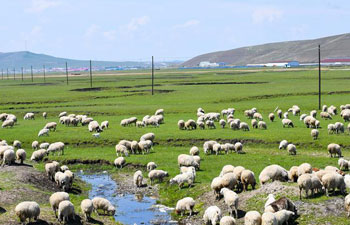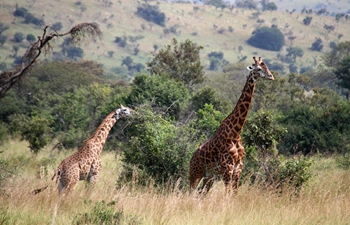HARBIN, June 9 (Xinhua) -- Li Xin carefully changes a diaper on a newborn Siberian tiger sound asleep in an incubator, trying not to disturb it, while around him a dozen cubs cry for milk.
Since its tigers began to give birth in early April, Siberian Tiger Park in Harbin, capital of northeast China's Heilongjiang Province, has seen the arrival some 60 cubs this season.
The park is home to more than 1,300 Siberian tigers and contains a branch of the Siberian Tiger Breeding Center, the world's largest professional breeding center for the Siberian tigers.
Tiger keepers like Li look after cubs at the breeding base if the mother doesn't have enough milk or the skills to care for her offspring.
The job requires constant care. Huang Haitao, head of the breeding and veterinary department at the park, told Xinhua that any abnormalities may be a sign the cubs have a fatal disease so their condition must be checked frequently.
"A tiger cub can die of an acute disease within six hours of the first symptoms appearing, unless treated in time," Huang said.
Therefore, Li and his colleagues, who take care of around 50 tiger cubs at the base, work on shifts around the clock attending to the cubs.
Every morning as soon as he arrives in the base, Li checks the cubs' weight, body temperature, and excrement, all indicators of their health condition. During the day shift, he feeds them and changes their diapers every two or three hours.
At lunch time, the cubs begin to howl, crying out for food. Li feeds them bottles of warm goat milk. After they drink enough, Li burps them and listens to their belly.
"Burping indicates the milk has already flowed into their stomach," he said.
Li majored in animal husbandry and veterinary in Heilongjiang Agricultural Technology College. He has been working as a tiger keeper at the park since graduation in 2004.
"When I first came here, I was curious but also afraid of being hurt by the tigers. Fortunately, my senior colleagues were very kind and patiently showed me how to work with the animals," Li recalled.
Now a senior keeper himself, Li works diligently caring for the animals. During the birthing season, his team works 32-hour shifts, and night shift is common.
"I think the job is harder than taking care of my own child," said Li, 35, who became a father eight years ago.
When his own child was born, Li had been a tiger keeper for six years. His expertise in taking care of tiger cubs had helped him care for his own child.
"Changing diapers, burping and bathing the baby... it was easy for me while my wife did not have this experience and was afraid to do it at first," Li said.
As the immune system of tigers does not begin to mature until around six months of age, Li said one of his greatest hopes is that his small charges will not fall ill during their infancy.

















